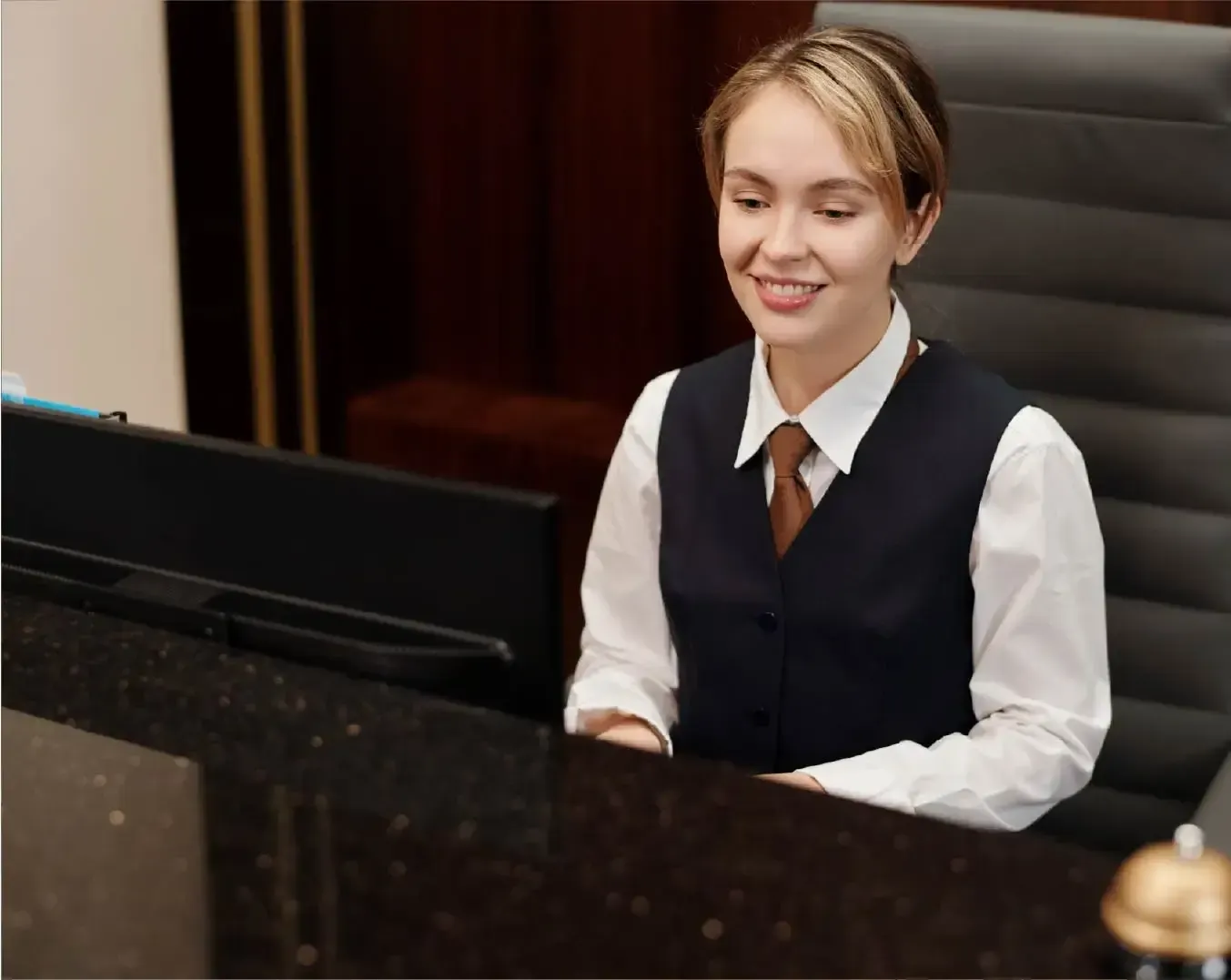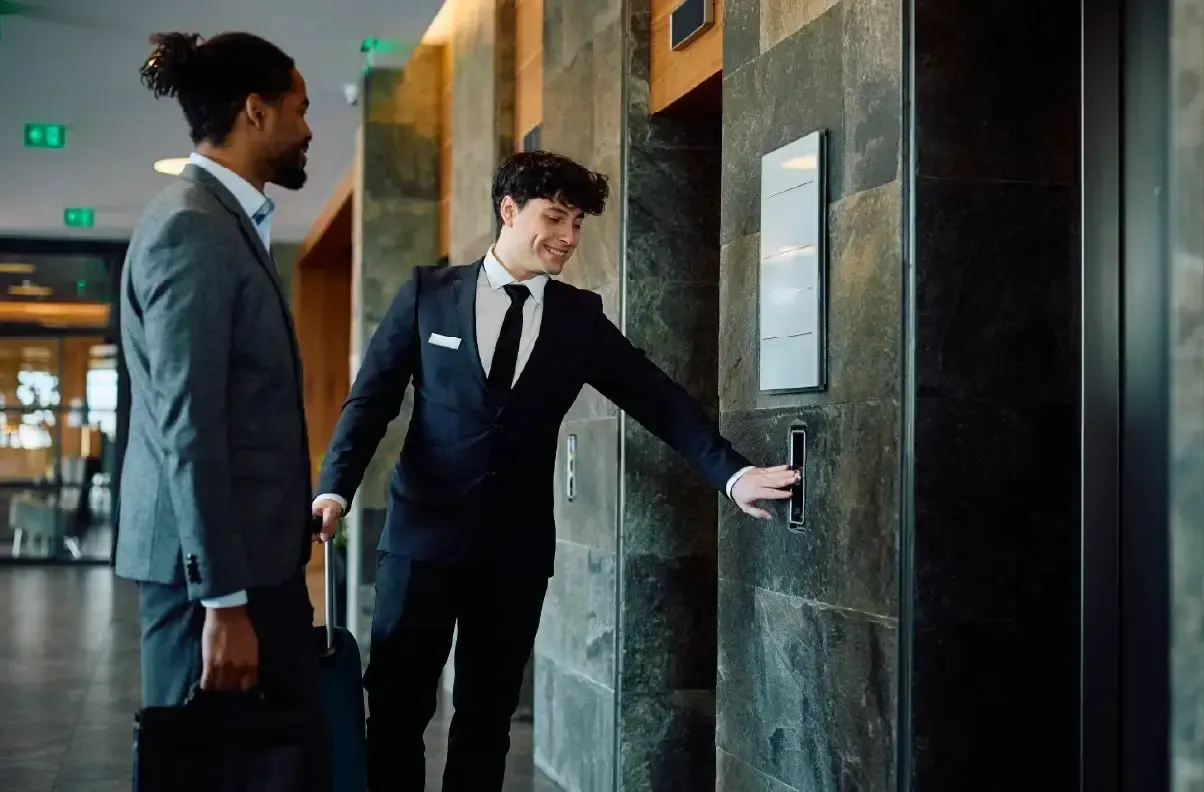As a hotelier, your goal is to make a positive impression on guests from the moment they walk through the door, and front desk operations play a vital role in achieving this. Inefficient front desk operations can damage that first impression and disrupt the guest's experience throughout their stay. Every guest who stays at your property will interact with front-of-house staff at some point, whether face-to-face or online. If issues arise during their stay, they will turn to the hotel front office for resolution.
A well-organized front desk team can effectively address any issues. Given the level of activity during a typical day, efficiency is crucial for successful front desk operations. Failing to meet guest expectations can lead to negative reviews and lost revenue, so it's important to embrace all available tools and processes that can enhance the guest experience.
Let’s talk about the best ways to improve front desk operations.
What are the main front desk duties?
The front desk serves is responsible for welcoming visitors, answering questions, and addressing any issues that may arise during their stay. It's essential that they always prioritize guest needs and anticipate their preferences to ensure a pleasant experience.
Additionally, the front desk handles tasks such as making reservations, checking guests in and out of their rooms, and accommodating special requests before, during, and after their stay. They also manage record-keeping, including updating files and guest profiles, while addressing various service requests throughout the day.

How to improve your front desk operations
1. Know your guests inside out
Nothing elevates guest experience more than truly knowing your guests. Keeping track of their preferences – from favorite rooms and extra pillows to allergies and dietary restrictions – can make a significant difference.
Storing guest data in a property management system allows you to deliver personalized service and stand out from competitors. Mews records guest preferences and actions, enabling you to provide tailored experiences. For instance, allergies can be flagged automatically for F&B and housekeeping, while room preferences can be referenced in reservation reports and housekeeping tasks.
Consider a guest who enjoys a specific newspaper every morning. With your PMS, you can create a daily task to ensure the newspaper is purchased during their stay, enhancing their experience.
Furthermore, engaging with guests directly can provide invaluable insights. What may be a minor issue for one guest could be a significant concern for another. By conversing with guests, you might uncover issues like internet connectivity problems in certain rooms. Addressing these concerns promptly can turn potential negative experiences into positive ones, especially for business travelers reliant on reliable broadband.
2. Prioritize tasks accordingly
The check-in experience can vary widely depending on the type of hotel. Boutique hotels often prioritize personalized attention, while larger establishments emphasize efficiency and speed due to higher volumes of guests. Given that the front desk serves as the hotel's central hub, requests can arrive at any time, requiring efficient prioritization and organization to ensure smooth operations for all staff members.
The approach to front office management should align with the unique characteristics of your property and guest demographics. Understanding the typical guest profile can guide your front desk policies. Leisure travelers often seek a homely atmosphere and personalized service, while business travelers prioritize efficiency and streamlined processes. Tailoring your front desk operations to meet these differing expectations is essential for delivering exceptional guest experiences.
3. Offer regular training to your staff
The most effective way to prepare your front desk team for any situation is to provide regular support and training. Empowered staff members make confident decisions and handle unfolding events professionally. It's important to have a structured plan for delivering training on basic processes and additional skills such as time management, customer communication, and organization.
Create a comprehensive hotel operations manual specifically for the front desk that clearly outlines best practices and role expectations for your team. Since many hotel managers and owners may not have the time for extensive face-to-face training, consider designating an employee to handle this task or hiring a professional trainer. Additionally, designate a staff member for each shift to be responsible for problem resolution.
When documenting procedures, prioritize practicality. Define essential information and optional details to ensure efficiency during busy periods. For example, specify mandatory information to provide during check-in and identify optional details that can be shared if the guest is not in a hurry.
Utilize guest reviews as valuable feedback. Identify receptionists mentioned in positive reviews and study their best practices to incorporate into your operations manual. Host front office meetings where experienced staff members can demonstrate effective check-in procedures for the team to learn from.
Leverage your reception team's expertise by letting them lead training sessions in their expertise areas. Continuously seek opportunities for professional development by attending webinars hosted by hospitality tech providers to stay updated on new tools and techniques for enhancing front-office operations.

4. Learn about the local area
One of the most compelling aspects of Airbnb is its emphasis on local experiences. Guests often seek to immerse themselves in the local culture and lifestyle. There's no reason why hotels can't offer a similar experience. Each team member should possess sufficient knowledge to recommend shops, restaurants, leisure activities, and local attractions to guests.
To enhance your concierge service, consider creating a tourist guide featuring popular recommendations. You could also provide discounts and coupons for local hotspots and help make bookings for guests. These thoughtful gestures are appreciated and can contribute to repeat business and positive reviews.
You may also like:
- How to automate the hotel customer journey?
- Generate more revenue from the pre-arrival stage
- How to get more direct bookings at your hotel
5. Harness the power of technology
Modern hotel management software requires advanced solutions. Handling incoming reservations, managing multiple distribution channels, guest communication and support, reviews and more requires significant effort. Without the right tools, hoteliers risk overbooking rooms and disappointing guests.
A robust hotel front desk software equips your team with everything they need to succeed. You can attach customized and automated tasks to bookings to track responsibilities. The software allows you to email payment requests directly to guests and receive alerts upon payment or expiration. Guests can skip reception queues by checking in on their own using a tablet or with assistance from a team member. Furthermore, you can consolidate messages from colleagues and guests in one location, accessible via the housekeeping app, virtual concierge, or within the platform itself.
6. Embrace automation
While you shouldn't rush guests through check-in, it's important to work efficiently to respect their valuable time. Providing fast and efficient service will undoubtedly keep your customers happy.
Identify tasks that you perform repeatedly but don't directly enhance the guest experience. Look for opportunities to automate these tasks to save time, allowing you to focus more on your guests. For instance, if you find yourself generating and sending the same report to another department regularly, consider automating this process.
Similarly, if you send emails at different stages of the guest journey for upselling or improving the guest experience, explore automation options for these tasks.
Payments represent one of the most impactful areas where automation can significantly improve front desk operations. Why keep guests waiting at reception for manual credit card payments when this process can be automated? By automating repetitive tasks, you can reduce staff boredom, increase efficiency and allocate more time to providing excellent service to your guests.
Key technology your hotel should use to improve front desk operations
To enhance front desk operations, an all-in-one PMS is essential. This system enables you to streamline daily activities, freeing up time to focus on guest interactions. Many manual tasks can be simplified with a PMS, from automating task updates to managing tasks remotely with cloud-based, mobile software.
Additionally, a PMS facilitates efficient management of group reservations and automates key aspects of the check-in and check-out processes, such as key-cutting, passport screening and payments. Automation lets your staff spend less time behind screens and more time creating unique and memorable guest experiences.
Conclusion
The quality of your front desk operations is measured by two standards: whether you can meet your brand's expectations and whether you can exceed your guests' expectations. To achieve this, you need to establish your standards and identify your guests, using them as a roadmap to create internal procedures. Implementing the right PMS, like Mews, can be a powerful tool to increase your front desk efficiency.
If you're still relying on handwritten notes or Excel spreadsheets, you're impeding your daily operations and exposing your business to unnecessary risks. With Mews, you can reduce check-in queues at reception by offering self-service kiosks with integrated payment options. Additionally, it's easy to manage user access rights to safeguard customer data and maintain operational control.
Automation will minimize errors and free up time for you and your staff to focus on guests. By centralizing information, you can access it instantly, whenever and wherever you need it, making guests feel valued and strengthening their connection to your hotel brand.
Moreover, happy guests tend to spend more, which can increase your ADR along with positive guest review ratings. Don’t just take our word for it – explore our customer success stories or, better yet, book a demo with one of our experts to discover how you can enhance your hotel front desk operations.
Thinking about changing PMS?

If you really want to improve your front desk operations, it might mean switching to a more modern, cloud-native PMS. It's a big decision, and one you shouldn't rush into.
Our Guide to Switching PMS is here to help. It includes the ten must-ask questions to any potential new provider, as well as typical timelines and onboarding processes so you know what to expect.
Written by

Eva Lacalle
Eva a plus d’une décennie d’expérience internationale dans le marketing, le marketing numérique, la communication et l’événementiel. Lorsqu’elle ne travaille pas, elle aime surfer, danser ou explorer le monde.










